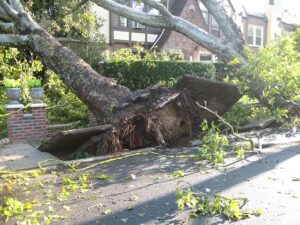You may have seen the reports of destructive weather lately in the Dallas, Texas area. Over 750,000 people were without power after the storms. Trees fell on homes. People lost their lives. I live in Dallas. This storm confirmed that being prepared for a disaster makes a huge difference. Here’s what I learned dealing with a disaster and how disasters can help you with selling.
1. Plan ahead for any disaster.
You may work remotely in sales or work in an office. Think now about what could go wrong that would prevent you from working. I work remotely. The last storm a few years ago left me for days without power. My house was below 50 degrees. I was lucky my pipes didn’t burst and flood my house as some other neighbors experienced.
Since then I had a generator installed. This time my entire neighborhood lost power for days. I was able to charge phones and keep food refrigerated for my neighbors because I had the generator. For them at least the weather wasn’t too hot or too cold or my house would have been a dormitory.
What do you need to plan for? Here are some ideas to consider.
2. Who can your customers contact when they can’t reach you?
I had power so I could call people. My internet was up. What if you had no internet or phone? How would your customers reach you? Now is the time to give them a plan with a backup contact. It should be someone not in your area in case they are also affected by the disaster.
3. Is your data safe?
Lots of people work remotely today. They think that having an external hard drive as a backup will keep their data safe. But hacking can prevent data access. Having an alternate hard drive at least gives you access to data from before the hack. A local hard drive isn’t enough today.
A local hard drive doesn’t protect you from a fire or theft. Remote storage is a requirement today. Even with remote storage you have work to do to be sure your data is reliable. When is the last time you checked your remotely stored data? You do have your data stored remotely, don’t you? There are many different options to store your data remotely. Just be sure your daily data transfer is working as you expect. You don’t want to find out when you need it that your data isn’t transferring.
4. Would you have to get somewhere?
Travel during a disaster should not be your primary concern. Most warnings tell you to stay in place. Still, you may have to travel after the disaster. Would you be able to?
In a previous storm our electric gate froze in the ice. The cars couldn’t be moved out to the street because the gate didn’t open. In this storm there were people who parked cars outside and trees fell on their cars and damaged the cars. Consider where you leave your car the next time you learn of dangerous weather conditions. Park away from trees that could fall on your car. Put your car in a protected garage and be sure there would be access after a storm. Electric garage doors can be opened manually. Do you know how?
Thankfully, disasters don’t happen often. Now is the time to consider your unique situation and make plans for if and when a disaster happens to you. You want to be able to run your business without unnecessarily losing too many sales.
